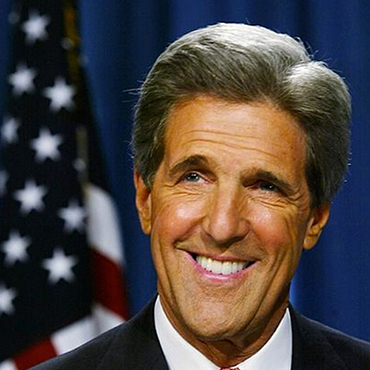Kerry seeks talent boost from Silicon Valley
Secretary of State John Kerry called on the technology industry for help with staffing and ideas for the agency's Global Engagement Center.

At a California conference, Secretary of State John Kerry urged Silicon Valley workers "to help us cope with some very significant challenges."
The State Department's Global Engagement Center is not growing fast enough, and Secretary of State John Kerry said Silicon Valley companies could do more to help.
The center is authorized to hire 131 employees but only has about 68. "Why are we not at full force? Because it's pretty competitive out here and tough to get people," Kerry said at the Virtuous Circle conference in California. "We've hired some folks from out here, but obviously we don't have start-up opportunities or other kinds of [return on investment] that excites people to come. So it's hard to find the talent and fill the slots."
He also said he was seeking ideas to help combat violent extremism and human trafficking.
The center is an interagency entity that is housed at the State Department and charged with coordinating U.S. counterterrorism messaging to foreign audiences. Led by Special Envoy and Coordinator Michael Lumpkin, the center manages about 65 initiatives and has $20 billion in funding.
"This is what the Global Engagement Center is all about, trying to partner with you and work with you [so] you can bring us ideas and you can bring us solutions to some of these problems," Kerry said.
Of course, many in Silicon Valley are wary of government overtures because of the surveillance revelations in Edward Snowden's leaks and because of ongoing efforts by federal law enforcement agencies and others to find a way to access encrypted communications during criminal investigations.
Kerry said he is not trying to turn technology companies into government agencies, but companies and individuals have some obligation to pitch in.
"We are saying you are citizens," he said. "You are both corporate citizens and, in the case of many of your entities, American business citizens, and there is a corporate citizenship standard as well. And so we're simply looking for a sense of responsibility as citizens to be able to help us cope with some very significant challenges."
In addition, the digital revolution is prompting a search for a new normal in the field of international relations as rivals move their disputes into cyberspace. Kerry cited Russian attempts to interfere with U.S. elections as an example.
"I think we're going to have to figure out what that balance is going to be in a world where we see Russians allowing hackers and instructing some people to try to interfere with our democracy," he said. "We've got to figure out how we manage this arms race, folks. I don't have all the answers, except to work to try to get the norms and standards agreed upon internationally, which is the job I have at least for another four months and then I pass on to something else."
Kerry also said the State Department is doing its best to make sure its employees have the digital skills to protect the agency's assets and promote U.S. interests.
"I've made certain that we have a digital officer in every embassy," he said. "We've got 139 digital officers now in embassies around the world."
But he added that work remained to make sure that rank-and-file Foreign Service officers have the technical skills necessary to do their jobs.





